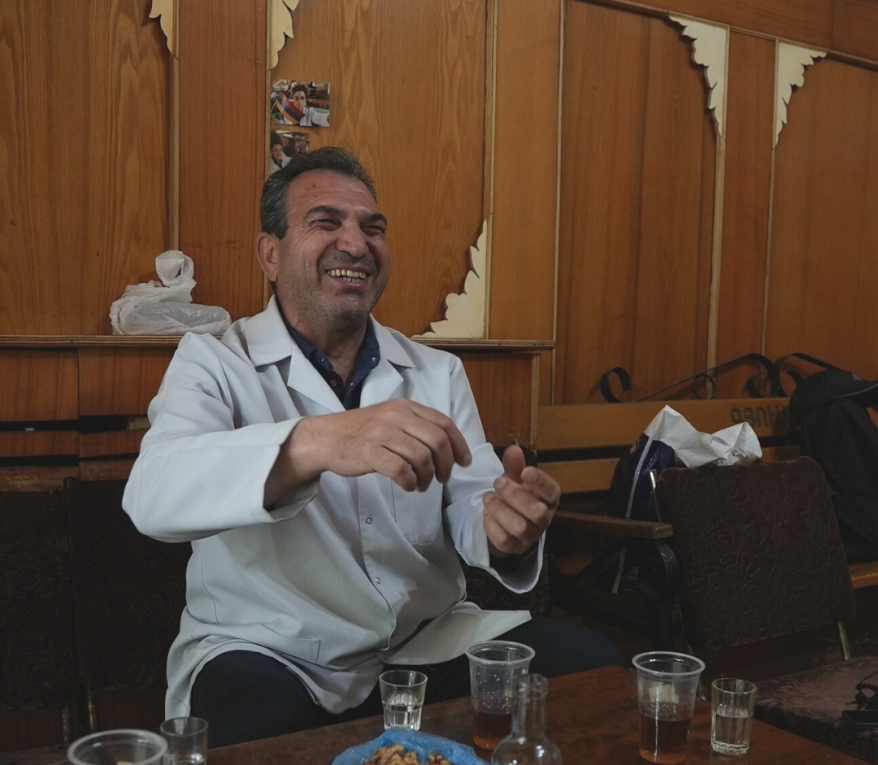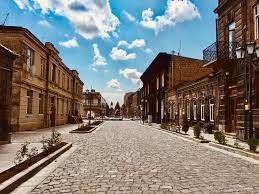Remnants of Armenia’s Soviet history can be found all over the country – if you know where to look. Though the northern city of Gyumri is most known for its rich culture and architecture reminiscent of its days under Russian Imperialist rule, it’s got its fair share of Soviet gems, like Luxe Barbershop. Opened in 1940, the establishment has been giving locals a shave for over 80 years.
We first stumbled upon Luxe while exploring Gyumri in search of sites for a Soviet-themed road trip itinerary. After a day wandering through ramshackle buildings, chasing wisps of that Soviet spirit, here it was – alive and in spectacular color.
Nearly a year later, we returned to the place that had charmed us so, and spoke with Apin Chakhoyan, former musician and a barber beloved by his clients and fellow barbers, about his time working at Luxe.
“This isn’t just a barbershop,” he says with a smile. “It’s a museum, a life story, a whole other world, our family.” Apin loves his workplace.
And what a workplace to have! Walk inside and you’ll find yourself instantly transported to another era, with a tin ceiling, chandeliers, and wood wall paneling. The window sills are lined with plants, and the cracked red seats sit before countertops laden with old mechanical hair clippers, scissors, and washbasins. Even the hardwood floors are original, and they have the scuff marks to prove it.
A living museum of the Soviet Era, Luxe has a touch of wonder to its atmosphere. When Argentinian-Armenian musician Alin Demirdjian happened upon the place one day, she was instantly captivated, just like us. “It was a strange place, with plants and birds and men dressed in white. It was surreal. And I fell in love.”
Clad in pressed white robes, the barbers at Luxe continue the work they’ve been doing for decades. The establishment has served Armenian actors, poets, and scholars, withstanding the devastating earthquake of 1988 and weathering the subsequent collapse of the Soviet Union. Still, both physical and emotional losses to the community have seen many people leave the city in search of better prospects.
The people of Gyumri have always been strong, facing hardships with a sense of humor signature to the city. And there’s nothing the barbers at Luxe love more than a good joke. “It’s their wit,” Apin says, “that I like.” He lists off barbers with great senses of humor, like Sako and Avo and Maymon.
“The sense of humor is born from the location, it’s inherent to the city,” Apin continues. “This was a city of tradespeople” where one was constantly meeting people from different places who would provide inspiration for jokes. “We make something out of nothing. It’s all we’ve known since we first opened our eyes.”
When we asked if Apin could share a joke or funny story with us, he told us about Master Rudik, another barber at Luxe. “He was a humorous man who loved to eat and drink. He would poke fun at people, and he was very grumpy.” Though his given name was Rudik, the other barbers often called him “Meymun,” after the Persian word for “monkey.” One day, while the barbers were standing outside, a man ran up asking for a quick haircut as he was running late for his train. “We told him to go ask for Master Meymun.” What the man didn’t know, and what the other barbers failed to tell him, was that Meymun was a nickname used secretly, and never to Rudik’s face. So, the man addressed Rudik as Master Meymun and asked for a quick haircut. “Sit down,” Rudik said. “The poor guy, he hadn’t even looked in the mirror before Meymun turned on the razor and shaved his head in one line from side to side and then front to back. “‘So who’s the Meymun here, me or you?’”
Alin Demirdjian saw that humorous spirit firsthand, a week after she first discovered the barbershop. Having always wanted to learn barbering, she hoped the barbers would take her on as an apprentice and brought along a friend for support. “They all look at us, because we are two women and because we don’t look like we are from Armenia. I ask, ‘if I go to Gyumri, can I come and learn with you?’ They laugh and say ‘yes of course.’ No resistance.” A couple weeks later, Alin found a house and moved to Gyumri. The next morning, she went to the barbershop, scissors in hand. “I say ‘okay, I’m here.’ They look at me, laugh, and say ‘we thought you were joking!’” Of course, it was no joke. And Alin began her 3-month apprenticeship that very day.
“What does a typical day at Luxe look like,” I asked her. “They come in the morning, they drink coffee, smoke their cigarettes.” In their free time, they play backgammon or chess or complete crossword puzzles. Each barber has his own loyal clients, many of whom have been frequenting the barbershop for years, and bring their sons for a shave when they, too, come of age.
It’s a social place, buzzing with life and that Soviet spirit. “Everything is Soviet,” Apin says. “The Soviet colors, the Soviet uniforms… even a Soviet approach. Come here and you’ll hear jokes, you can smoke, drink.”
“During Soviet times, people would come here and socialize – the place was very busy. They’d come to see their teachers, to get their hair cut, to laugh, to catch up, to hear a bit of news.”
He talks about Master Khanik, now retired, who taught more than 100 barbers during his tenure at Luxe. “The reason why the barbershop stayed this way is because of the traditions the first barbers put in place. When younger people would come to learn, they’d teach us everything, to respect our elders.”
The barbershop tells a story of family across generations, literally. Fathers teach their profession to their sons, who grow up to take their places. It has been almost two years since Alin worked with Apin and the others at Luxe, but she still considers everyone there her family. “They knew how to adopt me into their collective of which I still feel a part, even though I no longer go there every day.”
As both an apprentice and as a woman, it was sometimes difficult for Alin to get clients. Most had also been coming to the same barbers for years, and did not want to change. Still, the barbers “gave me a white apron so that I felt like one of them, so that the clients respected me more.” She would try and convince people in Gyumri to come for a free haircut so she could practice. “Sometimes the barbers would even let me cut their own hair.”
“They helped me overcome fears about barbering and made me feel less lonely in Gyumri, a city I moved to without any friends or family.” Alin feels so at home there that she even spent her last two birthdays at the barbershop.
Apin believes that travelers are drawn to Luxe not only for its old interior design, but for the warmth and humor that can be felt as soon as you enter through its doors. “If we didn’t have that beautiful soul, all these great people, this barbershop wouldn’t be here today. In its place would be a cafe or a shoe shop.”
“I don’t know what will happen after us. I’m just happy that I came here. I’ve met so many great people and learned a lot.”
If you’re interested in a shave, or simply want to have a look around, all you need to do is walk in. Unfortunately, only men are able to get a haircut or shave. However, the barbers often offer trims for women visitors that want a turn in the cracked red barbershop chair. The barbershop is open most days during the morning and daytime, and your patronage helps keep the place running. There’s also a donation box, should you wish to support further.
Luxe Barbershop is just one of many great stops you can experience on a road trip with us and the Soviet Time Machine itinerary.




